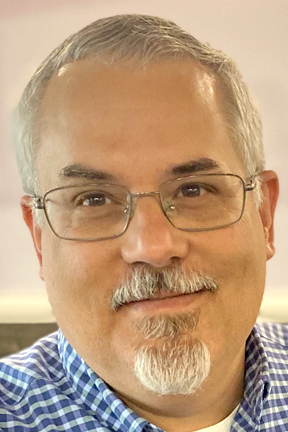Empowered • Acts 2:5-16, 36-38
By Roland L. McMillan

The followers of Jesus were waiting in Jerusalem for what Jesus had described as the “promise of the Father” (Acts 1:4). About 120 people were gathered including the apostles, Jesus’ mother, and the women from Galilee who were witnesses of Jesus’ death, burial, and resurrection (Luke 23:49, 55; 24: 1-10; Acts 1:13-15). They were gathered on the day of Pentecost, 50 days after the Passover associated with Jesus’ crucifixion. In Old Testament times, Pentecost was one of the great pilgrimage festivals, along with Passover and Tabernacles, when Jerusalem would swell with pilgrims. Pentecost, or the Festival of Weeks, was a time to recognize God as the ultimate source of blessing at the beginning of the wheat harvest (e.g. Exodus 34:22, Numbers 28:26). This Old Testament harvest festival was about to take on a whole new meaning.
Jesus’ last words before he ascended were about waiting in Jerusalem for power from the Holy Spirit. Even though they were waiting, what happened seems to have been unexpected. Luke seems to have been struggling with the limits of language as he described the event. There was a sound “like” a violent wind. There were tongues “like” fire. Luke struggled with grammar too. The “tongues” are plural, but what happened as they “sat” or “rested” on the believers is singular, which is a little awkward. Luke’s use of language shows us that what happened is hard to describe with words.
As the Holy Spirit filled the followers of Jesus, they started speaking languages that they had not learned. Most likely they took turns speaking as the Holy Spirit enabled them. Even though Luke does not mention it, apparently the group of Jesus followers moved into the street, or maybe to the temple courts as this was happening. Luke implies a scene change, because of the crowd he mentions (2:6), and because the three thousand who accepted Peter’s message about Jesus (2:41) would not have fit into most places.
The crowd that gathered was made up of Jewish people who were originally from a broad, diverse geographic area. Like many people in the ancient world, and many people today, they were multi-lingual. To hear Galileans speaking all those languages was amazing, because these were not languages that anyone would have expected Galileans to know. The crowd was bewildered and filled with curiosity. They wanted an explanation for these unusual events.
The twelve apostles took center stage, with Peter as their spokesman. Peter talked about Joel 2:28-32, Psalm 16:8-11, and Psalm 110:1. He used these passages to explain Jesus’ life, miracles, crucifixion, resurrection, and ascension. In Acts 2:32, we see the apostles’ role as eyewitnesses to Jesus. This was not hearsay, or fable, or legend. The twelve apostles had experienced the events with Jesus themselves. Peter came to a powerful conclusion in Acts 2:36, saying that Jesus is Lord and Messiah. (Some translations say “Christ,” but “Christ” basically means “Messiah.”) Peter’s challenge to them would have been stunning, because he accused them of crucifying the long-awaited Messiah.
When the people in the crowd heard that they had rejected the Messiah, they wanted to know how to respond. So, they asked, “What should we do?” Peter answered with repentance, baptism, forgiveness, and the gift of the Holy Spirit. Repentance, turning away from sin and turning to Jesus, leads to forgiveness. Christian baptism symbolizes what has happened, and the coming of the Holy Spirit into a person’s life always is associated with conversion. Throughout Acts, the Spirit does not follow one set pattern when he comes. No formula exists for the Spirit’s coming, but his coming always is associated with a person submitting to Jesus as Lord.
People today say all kinds of things about Pentecost and the coming of the Holy Spirit. The emphasis in Acts 2 is clear. There is no hyper-emotionalism in the text. The Spirit came, as Jesus said he would, to empower his church for world mission. The emphasis in the text is not on an individual’s experience of “tongues.” Peter did not even talk about “tongues” in his sermon. Peter talked about Jesus based on his firsthand experience and based on Scripture. The diverse crowd at Pentecost was the first harvest of the church’s world mission, and the worldwide harvest continues today. Christianity started as a small, regional movement, mostly in Galilee. The Holy Spirit empowered the church to take the Jesus movement worldwide.
McMillan is pastor of Prentiss Church, Prentiss.




